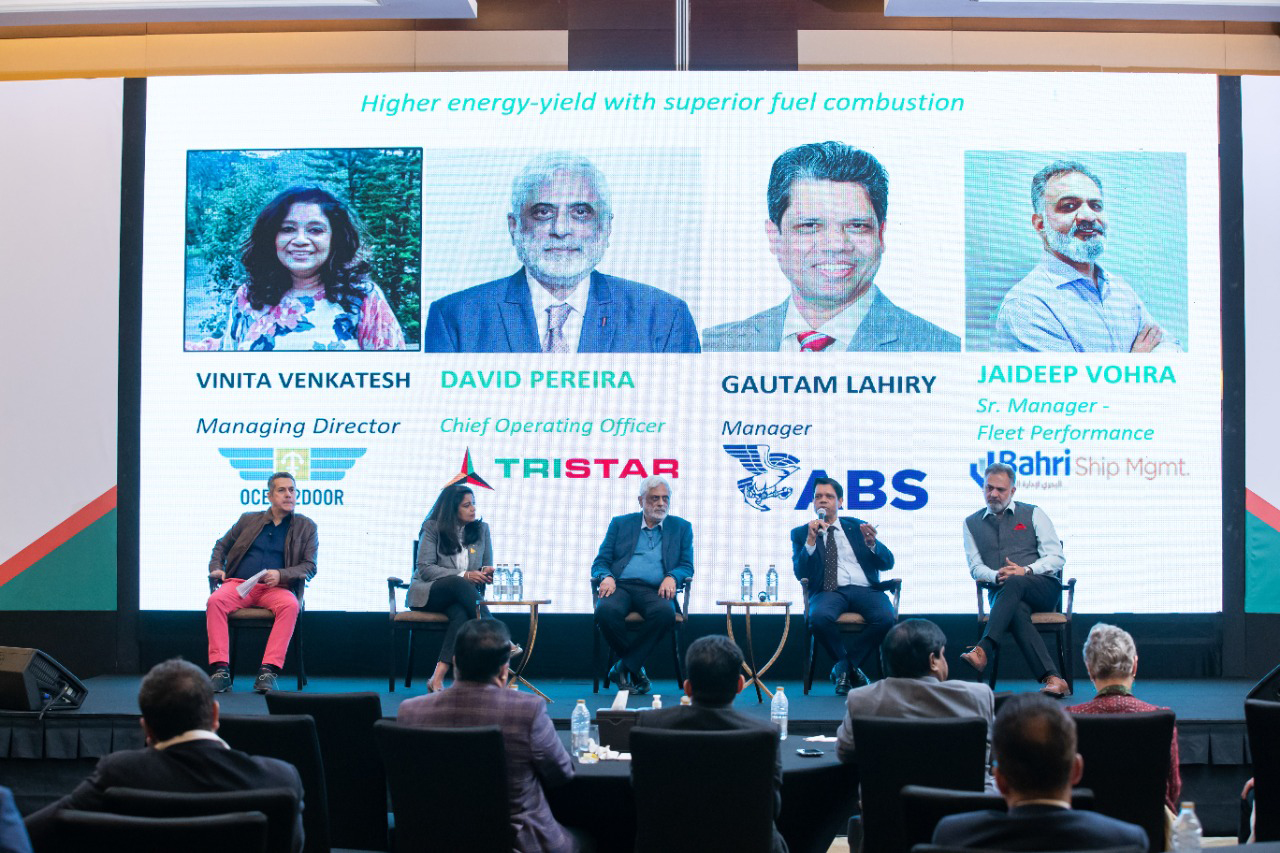Higher energy-yield with superior fuel combustion

While deliberations on meeting the IMO’s goal of cutting GHG emissions from shipping by 2050 progress, we need to focus on technology that is available today and to improve fuel combustion today. When fuel combustion is improved, emissions and engine wear are reduced, and fuel economy improves. At an IMarEST UAE branch technical meeting, Ocean2Door India presented the benefits of FuelSpec® Combustion Catalyst, which is a bridge technology that will allow shipping to burn less fossil fuel today, in a significantly cleaner operation, as we continue to benefit from the Blue economy.
Delivering the welcome address, NIKEEL IDNANI, Honorary Secretary IMarEST UAE branch, highlighted that complete fuel combustion leads to reduced – emissions and engine wear. He pointed out that marine diesel engines have been optimized in their design to operate at maximum efficiency. However, the Achilles heel are external factors such as inconsistent quality of the fuel that could affect fuel efficiency, wear to the engine and release of emissions. The end products that remain after the process of hydrocarbon fuel combustion, are released into the atmosphere which are harmful to human health and puts the planet in jeopardy. Efficient combustion reduces the energy waste and polluting nature of these end products. Efficient combustion is achieved when there is complete combustion of the fuel in the engine thereby providing maximum power or energy output. He said, “It’s all about getting the best green bang for your green buck”.
In her vivacious keynote address, Ms. VINITA VENKATESH, Managing Director, Ocean2Door India (Global Marketing & Distribution partner of FuelSpec® Combustion Catalyst) explained that patented FuelSpec® liquid combustion catalysts improve combustion efficiency, provide fuel savings, and reduce emissions resulting from Heavy fuel oil and Diesel fuel combustion (including ash, carbon dioxide, carbon monoxide, NOx, Sulfur dioxide, and unburned hydrocarbons). Vinita revealed that the catalysts work effectively on a range of fuels in 2-stroke and 4-stroke Diesel engines. Better combustion provides secondary benefits such as overall improved equipment performance, extended equipment life, and a reduction in operating and maintenance costs.
Overall, use of FuelSpec®, a green technology, provides a positive return-on-investment solution to asset owners, enables energy conservation and sustainability, and has a significant positive effect on human health and the environment.
Based on extensive field testing, empirical observations, stoichiometric analyses, mass balance calculations and thermodynamic postulates, the groundbreaking FuelSpec has demonstrated fuel savings of approximately 10% on fuel containing 1% or more sulfur, 8% on lighter Diesel fuels, and 7% on ultra-low sulfur Diesel. FuelSpec® catalysts are benign to the environment, have no negative effects of any kind on personnel, and no adverse impact from long-term use on the combustion equipment, fuel storage, piping & pumping equipment. All products of combustion exit through the exhaust and are also benign to the environment. There is no deposition or scaling of any kind on the equipment, or inside the combustion and exhaust spaces.
FuelSpec® catalysts are safe to transport, have a long shelf life, are chemically stable and easy to apply. There is no performance fade (prior use has demonstrated that 2-year old catalyst performs equivalent to freshly formulated batches). The catalysts mix easily with ultra-low sulfur (low asphaltene), medium sulfur fuels and high sulfur (high asphaltene) fuels, plus work effectively across a broad range of equipment operating conditions (including under less than maximum continuous rating conditions). The catalysts do not react with or degrade fuel, or undergo phase separation while in storage, and are easy to apply to bulk fuel tanks and central fueling facilities. Nor do they interfere with the effectiveness of other fuel additives (such as icing and corrosion inhibitors, lubricants, antistatic agents, and other additives) and/or emissions reduction systems such as SCR, DEF and Diesel Particulate Filters. Implementation of the catalyst systems requires only a minor retrofit to existing engines and fuel systems.
FuelSpec® catalysts have made significant advancements and innovations in reducing the effective dosing ratios and improving the injection equipment required for optimal fuel savings. The recommended dosing ratio is 1 part of FuelSpec® mixed with 3,840 parts of fuel-oil, by volume ensures the actual total amount of catalyst going into the engine is only about 1.4 mg/Kg, or 1.4 ppm.
FuelSpec® combustion catalysts extend the combustion process, producing a more uniform and complete combustion of the fuel. Superior fuel combustion produces a higher energy-yield (improved fuel economy), while being environmentally engaged with reduced emissions and engine wear.
In conclusion, Vinita said, “As work towards new fuels and technology options are developed in shipping’s sustainable course to reach IMO 2030 and 2050 GHG emission reduction targets, today’s seminar provided excellent insights on urgent short-term, easy to implement, emissions abatement measures. The deployment of energy efficiency technologies is vital in the short term to reduce the consumption of fossil fuels prior to that transition”.
A panel comprising of DAVID PEREIRA (COO, TRISTAR Maritime Logistics), GAUTAM LAHIRY (Manager, ABS Middle East), JAIDEEP VOHRA (Sr. Manager Fleet Performance, Bahri) and VINITA VENKATESH provided a platform for a lively interaction with the 115 attendees, at the swanky Fairmont hotel on the iconic Palm Jumeirah island in Dubai.

